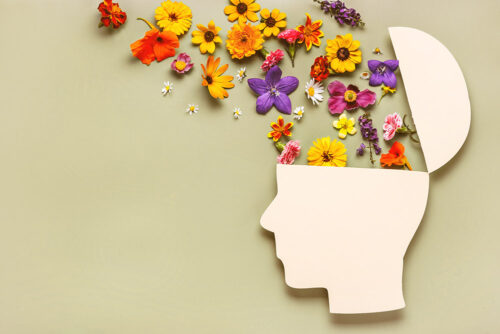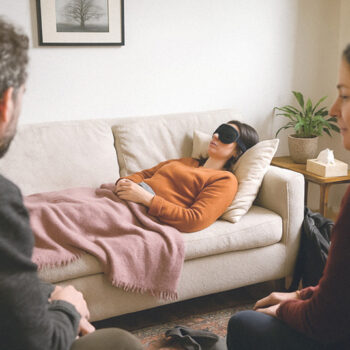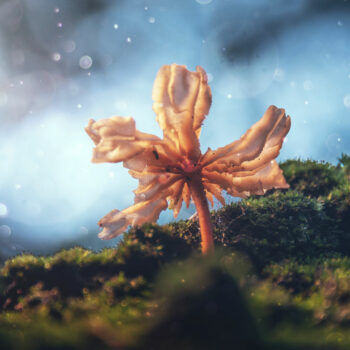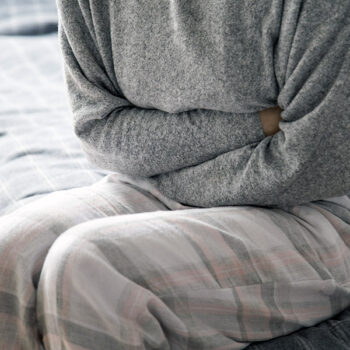Combining Psilocybin & Antidepressant
What happens when psilocybin meets antidepressants? This article explores the risks, interactions, and key considerations, helping you navigate this complex topic with clarity.

According to the World Health Organization, over 300 million people suffer from depression worldwide. In France, it’s 21% of the population, and in the United States, 19%. While these numbers have been steadily increasing for the past 50 years, the problem is not new. The quest for effective antidepressant treatments has thus always more or less existed.
Is Depression an Unsolvable Problem?
In modern medicine, depression is defined as a mood disorder characterized by persistent sadness, a lack of interest or pleasure in daily activities, and a loss of energy. While these symptoms are temporary for some, they are not for those suffering from clinical depression. In this severe form, they are constant and can last for weeks, months, or even years. Additionally, other phenomena can accompany this state: sleep disturbances, changes in appetite, problems with concentration, or libido issues.
Its impact is felt not only by those who suffer from it but also by their surrounding environment. This is why science has always been in search of long-lasting solutions to improve the mental health of those with depression.
Antidepressant Treatments
From prehistoric times, in regions from Mexico to Algeria, various populations have been seeking to relieve troubled souls. Traditional practices shed light on how therapeutic rituals worked at the time. Shamans viewed illness as the manifestation of a malevolent spirit that needed to be removed from the patient’s body. To achieve this, they notably used psychedelics like psilocybin mushrooms or Ayahuasca during shamanic trances.
In Ancient Greece and under the Roman Empire, medicine specialized and moved away from the realm of magic. According to the humoral theory developed by Hippocrates, an imbalance in one of the four bodily fluids (blood, lymph, yellow bile, and black bile) could lead to various mental or physical states. Specifically, melancholy was associated with an excess of black bile.
Drugs Discovered by Chance
It was much later that antidepressant treatments came into existence. Their history dates back to the mid-20th century. The first modern antidepressant, iproniazid, was accidentally discovered in the 1950s. Initially developed to combat tuberculosis, the substance appeared to make patients exceptionally happy.
Following this discovery, the 1950s and 1960s saw the emergence of other classes of antidepressants, including tricyclics like imipramine, and monoamine oxidase inhibitors (MAOIs). However, these medications had numerous side effects and dangerous interactions, prompting researchers to continue their investigations.
The Advent of SSRIs
It was in the 1980s that modern treatments came into being. Selective serotonin reuptake inhibitors (SSRIs) like Prozac became the flagship treatment for depression. In the medical world, this was a revolution: they were better tolerated and had fewer side effects than their predecessors. Since then, various other classes of antidepressants have been developed, such as serotonin-norepinephrine reuptake inhibitors (SNRIs).
Psilocybin for Depressed Individuals
Treatment-Resistant Patients
Medications targeting the brain’s chemical imbalances are often the first medical response to depression. However, not all patients respond to these treatments, and there are concerns about the long-term health consequences of such prescriptions (increased risk of heart attack or stroke).
These shortcomings have led to the exploration of new therapeutic methods, such as psilocybin. As new research emerges, this molecule is increasingly being favored for its potential effects on depression. For about a decade now, legal psychedelic retreats and psilocybin microdosing solutions have been available to help depressed individuals in their quest for well-being.
By definition, people suffering from depression often undergo conventional treatment. However, the interaction between such medication and magic mushrooms is not always clear. Each class of antidepressants has different indications, complicating the psilocybin-antidepressant combination.
Psilocybin vs Antidepressants
In depression, one of the natural neurotransmitters plays a key role: serotonin. It’s involved in regulating mood, anxiety, and sleep. Therefore, most substances supposed to influence this illness are related to serotonin.
How Psilocybin Affects Serotonin
As a reminder, psilocybin is an active substance found in certain varieties of hallucinogenic mushrooms. After ingestion, psilocybin is converted into psilocin, known for its effects on serotonin-related neurons. It disrupts the serotonergic system in a surprising and potentially favorable way… but how?
When Psilocybin Mimics Serotonin
Interestingly, psilocin has a chemical structure similar to that of serotonin. Therefore, it can elicit a response similar to the neurotransmitter. The brain is fooled and alters its functioning. When psilocin reaches the neurons, the 5-HT2A receptors detect activity similar to serotonin and send the corresponding intracellular signal.
This triggers a chain reaction. On one hand, certain neural networks synchronize or desynchronize, imposing specific or unusual communications on certain brain areas. Additionally, the body releases other neurotransmitters like glutamate and dopamine. Ultimately, all of this affects the brain regions involved in mood, perception, and cognition, and leads to altered states of consciousness: heightened sensations and emotions, hallucinations, etc.
Psilocin is said to act as an agonist of serotonin receptors.
In the context of treating depression or anxiety, the current theory is that psilocin can help “reset” dysfunctional neural circuits in people with these disorders.
Medications: The Reuptake Strategy
Medications based on serotonin reuptake follow a very different rule. Serotonin reuptake is a crucial biological process that regulates the concentration of serotonin in the space between two neurons: the synaptic cleft.
Under normal circumstances, a first neuron releases a certain amount of serotonin that binds to the receptors of a second neuron. This exchange triggers various physiological and psychological effects. Once serotonin has fulfilled its role with the second neuron, the residue is removed from the synaptic cleft to prevent overstimulation. This cleanup is called reuptake.
Blocking Synaptic Cleanup
SSRIs serve to prevent the cleanup of excess serotonin. This way, it continues to bind to receptors, and its concentration increases at the neuronal level.
Combining Psilocybin and Antidepressants ?
Psilocybin and antidepressants share a similar goal: to promote serotonergic reactions that affect mood or emotional stability. In this sense, the two substances can compete with each other.
Taking antidepressants and psilocybin mushrooms at the same time, therefore, requires careful consideration of the neurochemical implications. In the context of a psilocybin retreat or microdosing, the most appropriate methodology for treatment and individual specifics must be applied. Personalized supervision is crucial to eliminate risks and maximize the sensations of the psychedelic journey.
Let’s talk!
Schedule a free information session in English with one of our facilitators.
Drug Interactions: Never Combine
As we have seen, psilocybin acts on serotonin receptors in the brain, just like many antidepressants. This simultaneous action can lead to an excess of serotonin, known as serotonin syndrome.
This phenomenon is rare but requires caution, as it can be potentially dangerous. It is therefore recommended never to combine two serotonergic substances during the same period.
To take psilocybin, it is essential to find a way to stop the medication, which can only be done under medical supervision.
Withdrawal and Transition: Thinking in the Medium Term
For those considering discontinuing antidepressant treatment to consume magic truffles, the transition can be tricky to manage. Indeed, returning to life without chemical assistance is not easy.
To succeed in this step, it is necessary to:
- Engage in temporary therapy for support;
- Maintain daily physical activity to release endorphins, which can improve mood and reduce stress;
- Seek medical supervision to monitor relapses and withdrawal side effects.
Reduced Effectiveness
Moreover, it is believed that SSRIs could reduce the effectiveness of psilocybin. According to some accounts, people who are on long-term antidepressant treatment are likely to have a very attenuated psychedelic experience.
A recent study published in the Journal of Psychopharmacology aimed to explore the interactions between antidepressants and psilocybin. The study’s results show that the concurrent use of SSRIs or SNRIs with psilocybin could reduce the psychedelic effects of the latter in 51% of the study participants. One month after stopping, only 25.9% reported a reduction in effects.
However, the study’s authors acknowledge certain limitations, as this research is based on online declarations rather than laboratory observations.
Did you know?
A 2024 data analysis published in The BMJ shows that high doses of psilocybin can reduce depressive symptoms to a level comparable with the antidepressant escitalopram—while triggering fewer severe side effects than some traditional treatments.
FAQ on Antidepressants and Psilocybin
Can I combine antidepressants and psilocybin?
Before embarking on such an experience, it is important to consider clearing the body of the effects of medication by finding a safe way to gradually reduce and then stop the treatment for several weeks: at least two weeks for most antidepressants, and five weeks for MAOIs and fluoxetine.
Obviously, this should be done under a doctor’s supervision.
How long should I stop antidepressants before a psychedelic retreat?
Based on the results of some studies, taking antidepressants can diminish the effects of psilocybin for several weeks after completely stopping the treatment. Drug withdrawal should not be undertaken alone or at the request of anyone.
A doctor is the only qualified person to advise their patients on feasibility.
Can I take psilocybin and Prozac, Paxil, or Zoloft?
If you’re on a treatment course with Prozac, it is not recommended to take magic mushrooms at the same time. Consult your doctor to see if it is wise to stop the medication for a minimum of 5 weeks. As a reminder, stopping should be done in gradual stages.
Can I take psilocybin and Zoloft ou Paroxetine?
As with most SNRIs, combining psilocybin with sertraline (Zoloft) or paroxetine requires a gradual tapering of the medication under medical supervision. Current recommendations suggest stopping sertraline or paroxetine at least two weeks before the start of the retreat.
Can I take psilocybin and Venlafaxine (Effexor)?
Be cautious with combining an SNRI like Effexor (Venlafaxine) and psilocybin.
To take the psychedelic, it may be necessary to discontinue the Effexor treatment. When combining psilocybin with venlafaxine, it is recommended to stop the medication at least two weeks before consuming magic truffles. This step can only be taken under the control of a general practitioner or psychiatrist familiar with your case.
Can I take psilocybin and Laroxyl or Norset?
TCAs and TeCAs like Amitriptyline (Laroxyl) and Mirtazapine (Norset) work by increasing levels of serotonin. Their effects on the cardiovascular system are unpredictable, so it is not advisable to combine them with psilocybin or any psychoactive substance (MDMA, LSD, etc).
Can I microdose psilocybin while taking antidepressants?
Microdosing involves taking a small dose of psilocybin to achieve relaxing effects without a psychedelic journey. There is very little scientific data on this subject. Therefore, it is better not to combine the two until research delves into the topic.
Can I participate in a psychedelic retreat if I'm on antidepressants?
No, it’s not feasible to join a psychedelic retreat for depression if you’re on a prescription for antidepressants. However, it’s possible to participate a few weeks after discontinuing your treatment. Note that you might have a less pronounced psychedelic experience than other participants.
Written by Arnaud Beauregard,
Founder of Tangerine Retreat in 2022, I have followed several paths: initially trained as an engineer and then as an entrepreneur, I later pursued training in hypnotherapy to better understand the inner workings of the human mind. I discovered psychedelics at the age of 55. My encounter with altered states of consciousness proved to be a profound revelation which, over time, became a genuine passion.
Last updated on 18 September 2025





